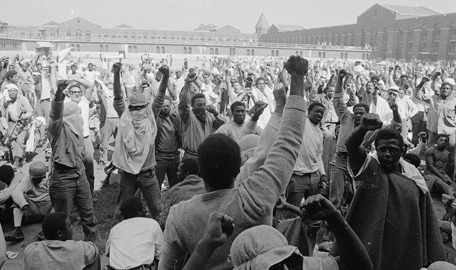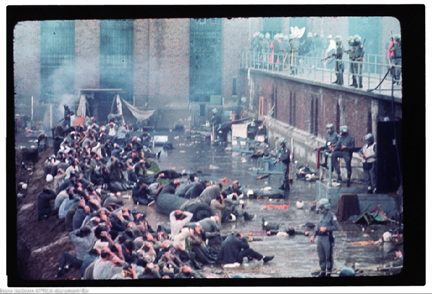
Remember Attica and What We Need Today
[The following is a compilation of reporting and analysis from MIM,
MIM(Prisons) and USW comrades to commemorate the Attica
uprising.]

This week, September 9 - 13 2011, marks the 40th anniversary of the Attica uprising where over 1200 prisoners acted as one, organized as a collective and occupied Attica Correctional Facility in New York State. The uprising ended in what a state commission described as “the bloodiest one-day encounter between Americans since the Civil War”, “[w]ith the exception of the Indian massacres in the late nineteenth century[.]”
In 1991, MIM Notes ran a special supplement to commemorate the 20th anniversary, which documented that historic event and its legacy. That same year, prisoners in New York, New Jersey and Maryland boycotted all programming on September 13 to “give honor to the martyrs and warriors who suffered, and are still suffering, under the suppression of the American prison system.”
The demands of the Attica prisoners in 1971 included things such as allowing New York prisoners to be politically active without intimidation or reprisals, an end to all censorship of mail and media, more educational and work opportunities that pay minimum wage, and release without parole conditions. In addition to these righteous demands, the prisoners connected their struggle to that of the people of the Third World. From History Condemns Prison Reform by MC11:
The Attica prisoners in 1971 were not asking for the sort of reforms liberals then and now are so anxious to implement in order to make themselves feel better. The Attica prisoners recognized the criminal justice system as a powerful weapon in the arsenal of the capitalist class, and they wanted to turn that weapon on their oppressors.
“We have discovered… the frustration of negotiating with a political system bent on genocide,” the prisoners wrote in a statement smuggled out during the week following the massacre.
“Killings are being committed not only in VietNam, but in Bengla Desh, Africa and South America. Is it not so that our Declaration of Independence provides that when a government oppresses the people, they have a right to abolish it and create a new government? And we at ‘Attica’ and all revolutionaries across the nation are exercising that right! The time is now that all third world people acknowledge the true oppressor and expose him to the world!!”(1)
Notes: 1. Berkeley Tribe Vol. 6, no. 8. Oct.1-7, 1971.
In the lead article of the MIM Notes supplement, a prisoner mentions that Attica marked the rise of a strong prison movement during the early 1970s. In the last year we’ve seen strikes in Georgia and California where thousands of prisoners participated across many prisons. Yet, it seems the prison movement has a steeper mountain to climb to get to the point that the struggle reached in those days.

Looking back on Attica and those past rebellions, one sees the start and finish of a period where the contradiction between prisoners and the state was at the forefront. The struggle during that period led to some progress on the side of prisoners in the form of temporary rights, concessions and free world support for captives. But more importantly, we saw collective organization on a mass scale throughout the U.$. prison system that united prisoners around their common suffering and abuse. This unity and struggle pushed the state back some. At the same time, it also led the state to develop a plan for permanent long-term isolation prisons, as well as policies that push psychotropic drugs on prisoners while programming is once again taken away, reinforcing the futility of prison reform. Even when the state faces significant resistance these days, it comes in the form of lawsuits in their courts, and hunger strikes where they control communications and negotiations very tightly. We’re still in the stage of playing their game by their rules.
It was just two years ago, on 17 September 2009 that United Struggle from Within comrade Amare (Ra’d) Selton died in Attica. Selton was a regular contributor to Under Lock & Key and MIM-led study groups, and often ended up in confrontations with prison guards. We do not know the exact circumstances surrounding his death, but MIM(Prisons) holds the State of New York responsible. He is one of many comrades who have disappeared after being sent to Attica in recent years, indicating the legacy of repression that has not lessened.
In MIM Notes, MC67 interviewed Akil Aljundi, one of the Attica Brothers that filed suit (and eventually won) against the State of New York following the murder of 32 of his comrades and 10 hostages, and the brutalization and denial of medical care to hundreds of others. MC67 concludes by asking what lessons should be drawn from the Attica uprising, to which Aljundi responds:
“Never trust the state. Always be prepared to look for the worst to happen. Be firm in your demands. Be clear in your objectives. But also realize that the state can be vicious.”
Related Articles:This article referenced in:








